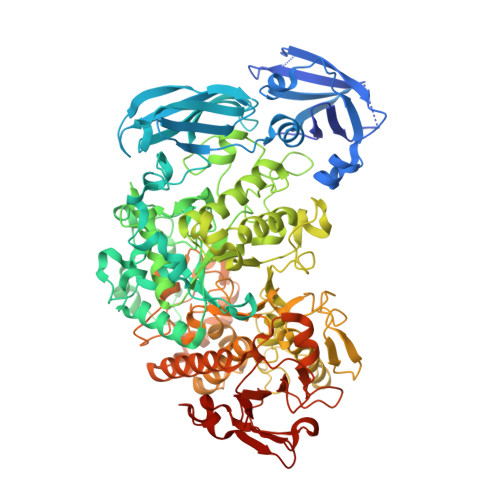Oligosaccharide and substrate binding in the starch debranching enzyme barley limit dextrinase
Moeller, M.S., Windahl, M.S., Sim, L., Bjstrup, M., Abou Hachem, M., Hindsgaul, O., Palcic, M., Svensson, B., Henriksen, A.(2015) J Mol Biol 427: 1263-1277
- PubMed: 25562209
- DOI: https://doi.org/10.1016/j.jmb.2014.12.019
- Primary Citation of Related Structures:
4J3S, 4J3T, 4J3U, 4J3V, 4J3W, 4J3X - PubMed Abstract:
Complete hydrolytic degradation of starch requires hydrolysis of both the α-1,4- and α-1,6-glucosidic bonds in amylopectin. Limit dextrinase (LD) is the only endogenous barley enzyme capable of hydrolyzing the α-1,6-glucosidic bond during seed germination, and impaired LD activity inevitably reduces the maltose and glucose yields from starch degradation. Crystal structures of barley LD and active-site mutants with natural substrates, products and substrate analogues were sought to better understand the facets of LD-substrate interactions that confine high activity of LD to branched maltooligosaccharides. For the first time, an intact α-1,6-glucosidically linked substrate spanning the active site of a LD or pullulanase has been trapped and characterized by crystallography. The crystal structure reveals both the branch and main-chain binding sites and is used to suggest a mechanism for nucleophilicity enhancement in the active site. The substrate, product and analogue complexes were further used to outline substrate binding subsites and substrate binding restraints and to suggest a mechanism for avoidance of dual α-1,6- and α-1,4-hydrolytic activity likely to be a biological necessity during starch synthesis.
Organizational Affiliation:
Carlsberg Laboratory, Gamle Carlsberg Vej 10, DK-1799 Copenhagen V, Denmark; Enzyme and Protein Chemistry, Department of Systems Biology, Technical University of Denmark, Søltofts Plads, Building 224, DK-2800 Kongens Lyngby, Denmark.

















